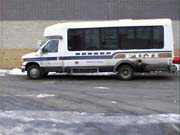The only thing more confusing than trying to keep track of the privately run mini-buses, also known as jitneys, that course through Jersey City streets may be trying to track down who is ultimately accountable for their operation.
Numerous residents have complained about erratic driving, extended idling, and unpredictable routes.
Trying to bring accountability home, Councilman Junior Maldonado requested at the Jan. 12 caucus meeting that the Jersey City Housing and Economic Development Commission (HEDC) be asked to submit a proposal on how to best regulate the jitneys.
“It’s going to be a big project. It’s not going to be an easy task” said Sam Jefferson, Director of the Commerce Division of the HEDC. “If they gave it over to my division, they’d have to make sure I have the manpower. My division is not uniformed.” According to Jefferson, only uniformed officers with marked vehicles can legally give out traffic tickets, suggesting that the Chief of Police should be involved in the planning process.
“The police handle the day to day operations, so he should be on board with that,” he said.
Jefferson says the first step will be to do a study to determine how many buses there are.
“Right now, whatever it is, it’s too many,” said Jefferson. “The way I’m looking it, it should be cut about 50 percent.”
Out of control
“They idle on the street for an extended period of time,” said Maldonado. “which is not good for the health and safety of Jersey City residents. Second, they’re reckless drivers. They drive with abandonment. They speed past New Jersey Transit buses to get the fare. The police department has done sweeps to pull over a lot of them, and they find they’re driving without insurance or licenses. Third, they drive wherever they want. NJ Transit [on the other hand] has particular routes. These guys drive wherever they want, looking for fares like taxis.”
Jitneys are assigned basic routes by the state, allowing them a level of autonomy.
“When I first looked into this, they have a basic route. They can stop at the NJ Transit bus stops,” Maldonado said. “They can make up their own routes as they go, but they have to stay on main city streets. They’re not supposed to go down the side streets. There is a state statute that tells them where they can go.”
The state
According to The New Jersey Department of Transportation, says there is no DOT statute regarding the minibuses.
“We don’t oversee the jitneys,” said DOT spokesman Mike Horan, referring the Reporter to the Motor Vehicle Commission.
But Dave Weinstein, a spokesman for the state’s Motor Vehicle Commission, his commission oversees the condition of the vehicles with state inspections, but it does not oversee their operations.
It was difficult to determine which agency ultimately oversees the jitney operations.
One local operator said that the DOT sets the fares ($2), requires the vans to have signage, and requires inspection every six months.
Yet, state DOT representatives stated that the DOT is not involved.
Horan suggested that the bus routes might be regulated on the federal level. Many jitneys bring passengers across the river, creating an interstate situation.
But David Longo of the Federal Motor Carrier Safety Association said that they only have jurisdiction over those busses that are known to cross state lines.
According to Katrina Jackson of the Federal Transit Administration, “The Federal Transit administration is not a regulatory agency, so we don’t regulate operation of mini buses of this kind. You should defer to your local DOT in NJ.”
The vendors
A vendor named “Faith,” who owns a number of jitney buses but didn’t want to give her last name or company, said the drivers are independent contractors who rent out the van for the day.
“They’re under regulations through the DOT. They have to be inspected every day,” said Faith. “The driver has to check how the bus is working. Drivers have periodic drug and alcohol tests. Insurance companies screen the companies that own the vehicle. Owners usually don’t take any drivers that aren’t under insurance regulations.”
Faith insisted that the DOT makes the van owners put signs up in the buses to indicate their routes.
Faith said that the jitney drivers also regulate themselves, assigning each other three-minute intervals at each stop.
“They all know each other,” she said. “They’ve been in the business for years. They decide to spread out pickups. If you don’t play by the rules, people will turn against you. If they’re aggressive, it’s because they’re trying to get to their fare.”
Back to local
Just like a jitney completing its route, the investigation arrives back to the starting point – plans to regulate locally.
“I envision that we come up with bus routes with specific streets to utilize so they don’t just run anywhere,” Maldonado said.
He also suggested that the city should limit the amount of jitneys in the city by issuing licenses, similar to medallions used by taxi drivers. There are 104 taxi cabs in Jersey City, according to Jefferson.
Bus routes would have to be created by city ordinance, Jefferson said, although the Commerce Division could offer recommendations.
“It’s much needed to have this done, because of all the traffic throughout the city,” said Jefferson. “Obviously people want jitneys, because people use them. If there wasn’t a demand for them, they wouldn’t be out there now.”
